Stress Tested: These School Librarians Hit the Breaking Point. Here’s How They Moved On.
How six librarians beaten down by censorship, school violence, overwork, and injury reset and made their next move.
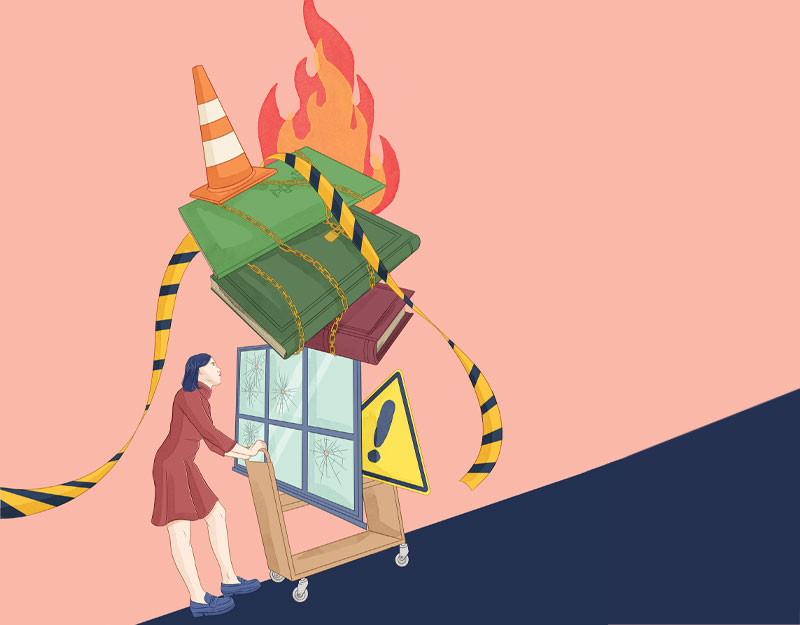 |
Illustration by Stephanie Singleton |
Realated Articles |
I love my career as a librarian. In fact, I value it so much that when I experienced burnout, I stepped away from my job as a high school library director. No matter what individual challenges or pressure we’re facing, most librarians can agree: the last few years have been a wild ride.
This January, Amanda M. Jones, a 2021 School Librarian of the Year, announced on Facebook that she was taking a medical sabbatical. When I spoke with her in April, she added that she was recovering from “anxiety, stress, and depression” after having panic attacks while on the job. Jones received death threats after speaking up at a public library board meeting defending access to LGBTQIA+ books—and surprised the whole country by suing her harassers. But fighting back has taken a toll on her health. She is healing through therapy, yoga, and writing a book about her experiences.
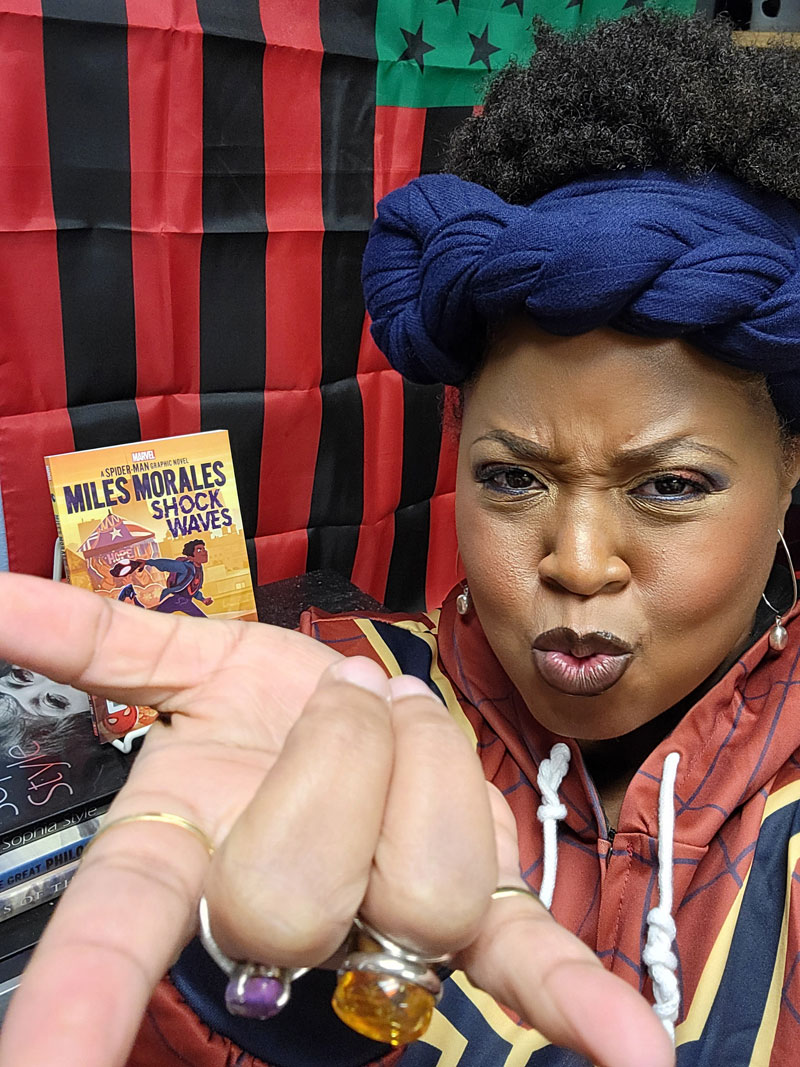 |
Jean Darnell “flipping a spidey” |
Numerous librarians have quit because of the emotional cost of the culture wars. About 300,000 teachers and other school staff, including librarians, departed between February 2020 and May 2022, according to the Bureau of Labor Statistics. I am part of that number, although I don’t consider myself a “former librarian,” as I now teach for an MLS program.
Some librarians cannot afford to switch gears or take time off. Others experiencing burnout don’t want to exit; they prefer to fight for change at their current schools, request a transfer to change schools within the district, or apply to teach at private schools or colleges. Many feel that public school work isn’t sustainable—and felt this before the COVID-19 pandemic.
Jean Darnell, a librarian at Dessau Middle School in Austin, TX, and author of the “Awaken Librarian” blog, is as dedicated and passionate as any librarian you will find, but she believes in setting limits.
As she wrote in her winter 2022-2023 article, “All I Can Do,” for American Educator (the American Federation of Teachers magazine), “I’m proud of this work, and I want to be here every day, making a difference for my kids and my community.
But after 20 years in education and serving close to 3,000 students just as a librarian, I don’t know if I can do it much longer. The increasing violence, decreasing resources—and now we are also expected to carry guns in the classroom as some Texas teachers are doing? It’s asking too much.”
Darnell recently recharged her emotional batteries at the National Joint Conference of Librarians of Color in St. Pete Beach, FL. “I’m on a high from that,” Darnell says, sharing that she connected with other Black and brown nerds (or “blerds”) while presenting on this same topic. Darnell dressed as Spider-Woman (the first Marvel Spider-Woman was a Black librarian), and her fellow presenters donned Black Panther costumes. During her presentation, the audience couldn’t get enough of her Spider-Woman dance. “I was flipping my spideys like I was 8 years old, not 44,” she says.
Darnell doesn’t minimize the difficulties of working in schools, but so far she has successfully prevented burnout. How? She says she differentiates between “observing” and “absorbing” the pain and trauma around her. A survivor of a school shooting, Darnell wrote on her blog that “the PTSD scars never fade.” However, Darnell says she has learned to put these kinds of traumas in a box while focusing on the creativity of librarianship. For example, she currently offers a learning program where kids can enter a raffle to win Air Jordan sneakers for annotating journal articles. She also teaches Black history through a variety of games and research activities. When Varian Johnson, author of Playing the Cards You’re Dealt, visited the library for an author talk, Darnell organized an accompanying spades tournament. So these days, her students have many reasons to rush into the library.
Still, Darnell asks herself how much longer she can do it. She considers herself an advocate for “emotional literacy” as a means of violence prevention. But librarians need far more support than they currently have as they advocate for safe schools and mental health support, and shoulder the burdens of the censorship wars.
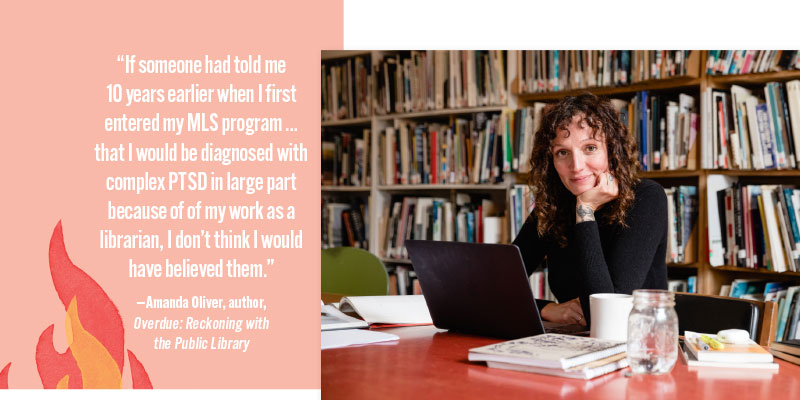 |
Amanda Oliver |
Dangers of librarian work
I was pushed out of my school by school violence. When a person with a weapon entered our eight-story New York City building containing multiple schools, we went into lockdown. I discovered that my key no longer worked in the library door, and I could not lock it. I’d been putting in work orders to get my doors fixed for the 13 years I’d worked there. The terror of finding myself unable to protect 100 young lives was more than I could bear. I resigned not long after.
Physical safety and emotional well-being are central themes in Amanda Oliver’s memoir and cultural history, Overdue: Reckoning with the Public Library (Chicago Review, 2022). Much of her book explores her time in schools, where she taught many traumatized, unhoused children with greater needs than she could address.
Oliver argues that the library field needs to acknowledge that librarians often serve as social workers and sometimes both first and second responders in emergencies. Librarians need better training, Oliver argues, and libraries themselves need to be overhauled. In an email, Oliver underscored that society’s most intractable problems simply cannot “be fixed by even the most empathetic or hardworking librarians,” and yet, “it often seems like that is what is being asked.”
Librarians can experience burnout from daily exposure to students’ trauma, especially without proper support. Oliver worked for almost six years in Title I elementary school libraries in Washington, DC, before moving to a public library where unhoused people often spent their entire days. Working with traumatized children, she often had to physically restrain them during emotional episodes. She once became a punching bag for a child to prevent him from throwing his body through a window. In public libraries, Oliver worked primarily with people who were unhoused or experiencing addiction or mental illness; she was also harassed, threatened, and stalked. She lived in a constant state of alertness and fight or flight, which was hard to shut off when she got home. Feeling numb and desensitized to the world, she was diagnosed with complex PTSD.
“If someone had told me 10 years earlier when I first entered my MLS program…that I would be diagnosed with complex PTSD in large part because of my work as a librarian, I don’t think I would have believed them,” she wrote in Overdue.
When Deirdre Sugiuchi, a former elementary school librarian and contributer to Electric Literature, worked in a Title I school in Athens, GA, she served many undocumented students. After one girl’s parents were forcibly removed from their home by Immigration and Customs Enforcement (ICE), the child knocked over a display of books and scratched her own arms.
“I wasn’t surprised that she acted out,” says Sugiuchi. “That’s the type of trauma my students dealt with on a day-to-day basis.” Witnessing this kind of suffering for years without any hope of resolution can be demoralizing to say the least.
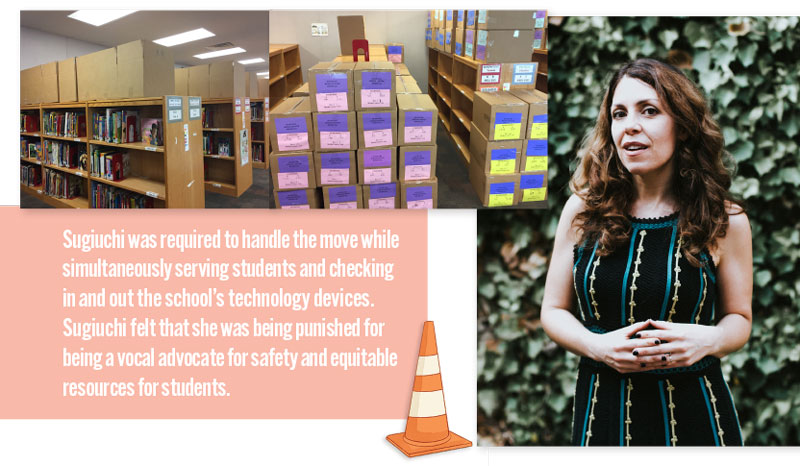 |
Deirdre Sugiuchi and the library books she she boxed |
Caring for our bodies
When librarians are not fighting for students or the freedom to read, we often advocate for safer conditions. When Sugiuchi was asked to work in a building with a black mold problem, she “refused to be silent.” She was told she could operate her library out of a nearby trailer instead and pack all the books herself. She agreed. The first time she boxed up the books before winter break, she had a month to complete the job. It was tight, but staff and parent volunteers helped.
After a year and a half, Sugiuchi’s new library space was renovated and available. This time, her administration asked her to pack the collection over a single week—on her own. Her requests for staff help were denied, and her principal refused to hire movers. She was required to handle the move while simultaneously serving students and checking in and out the school’s technology devices. Sugiuchi felt that she was being punished for being a vocal advocate for safety and equitable resources for students. So when her principal demanded that she pack the 8,000 books by herself in a week, she was angry and apprehensive, but obeyed.
“We forget that books are heavy,” Sugiuchi says. The second move caused a gradual repetitive stress injury that she didn’t feel immediately. But within weeks, Sugiuchi lost the use of both her arms. Diagnosed with multiple sprains and carpal tunnel in the wrists and hands, and cubital tunnel in the arm and elbow, she endured two surgeries in each arm and hand. She did not fully recover the use of her arms for nearly three years. Still, she returned to the library after the surgery, staying for a year so she was entitled to a settlement. The impact on Sugiuchi’s life and family was severe. She could not cook, drive, or help her only child apply to college. Her husband installed a touch-button lock to their front door because she could no longer hold or turn a key. The emotional trauma stayed with her. She shared that she sustained a “moral injury” as well as a physical one.
This story is shocking, but orthopedic injuries of varying levels of severity aren’t uncommon in library work, especially when one works solo. I’ve had carpal tunnel surgeries on both hands and foot surgery due to repetitive stress from lifting boxes. I never had an assistant, and for most of my school librarian years, I didn’t have any custodians willing to move new (or discarded) boxes of books and technology. I was often on duty teaching students for many more hours than classroom teachers, without time to decompress between lessons. When I got too tired, I often found myself lifting something heavy without thinking. I also submitted requests to repair broken bookcases for years without a complete fix. On several occasions, I had shelves full of books give way and start to fall. I’d put my body between the kids and falling pieces of wood.
When I told my doctor my bruises came from work as a librarian, she didn’t look surprised. “All my patients are like you,” she said. “Librarians, firefighters, police officers—the backbone of the city.” I hadn’t thought of librarians in the same category as these essential workers. Perhaps we always were.
When considering how librarians can stand up for ourselves, I reached out to Arlene Laverde, the librarian at Townsend Harris High School in Queens, NY, and a leader with 32 years’ experience in education. Laverde also serves as an instructor and coordinator of the Library Media Specialist program at the Graduate School of Library and Information Studies at City University of New York–Queens College (where I also teach) and is president of the New York Library Association. When Laverde ran for president, she wrote that she wanted to make a difference “as a Hispanic woman teaching in one of the most diverse places in the world.”
So how does Laverde prevent exhaustion? She says that assertiveness can be a form of self-care. “It took a long time for me to get this spine” and say no to unrealistic demands. But she doesn’t always have the same spine when students ask for last-minute favors. “I like them too much,” she says, laughing. “It’s easier to say no to adults.”
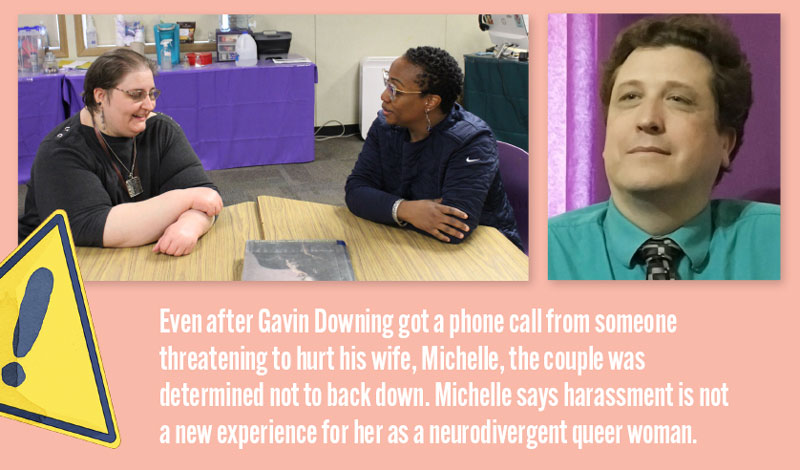 |
Michelle Downing (at left) with Krishna Richardson-Daniels, former
|
Strength in family and community
In December of 2021, Gavin Downing, a librarian in Washington State, found himself embroiled in a censorship battle with his principal and school board. He was the librarian at Cedar Heights Middle School in Covington, WA, when his principal removed the book Jack of Hearts (and Other Parts) by L. C. Rosen—and went on to challenge numerous other books. During this time, Downing suffered heart palpitations and anxiety requiring medication. Although he was able to transfer schools, Downing still has trouble sleeping.
The night when the principal first challenged Jack of Hearts and asked him for a list of all books with sexually explicit material, Gavin went home to his wife, Michelle Downing, feeling shaken. Michelle, a librarian who currently works in an administrative capacity with the Technology Access Foundation in Seattle, studied library ethics for her MLS. “We’ve got this. We’ve trained for this,” she assured Gavin.
Even after Gavin got a phone call at work from someone threatening to hurt Michelle, the couple was determined not to back down. Michelle says that harassment is not a new experience for her as a neurodivergent queer woman.
During the 2021–2022 school year, the Downings felt as if they worked two jobs—educators by day and activists by night. When Gavin came home in the evening, Michelle was waiting to help him with mountains of paperwork and countless phone calls: to his union, the American Library Association, GLSEN, the Anti-Defamation League, and the ACLU. Social justice librarianship is at the foundation of their marriage.
How do they avoid burnout? “You can’t self-care your way out of a toxic system, period,” Michelle says. However, the couple found moral and practical support from their communities. Michelle says that her autism helped her brain absorb vast quantities of information involved in Gavin’s case, making connections, and finding patterns that others might miss.
Gavin credits changing schools for avoiding burnout. He is happier at his current job at Kentridge High School in Kent, WA. Feeling valued helps, too. The Washington Library Association recognized his work with the Candace Morgan Intellectual Freedom Award. His students’ heartfelt gratitude for protecting their rights also keeps him going.
Do we stay or go?
Many think of librarianship as a vocation, so the decision whether to stay or go can be fraught. For Sugiuchi and Oliver, leaving the profession permanently was necessary for self-preservation. Downing found that switching gears to a new school was just what he needed. “I ran into my union rep, and she remarked just how much happier I was looking” after transferring schools, he says. Though Darnell publicly questioned in December how much longer she’d last, she sounded determined to stay when we spoke this spring. “I enjoy sharing my candlelight with the kids because, occasionally, the limits of our society—metaphorically—blows their wick out.”
I like Darnell’s image of librarians carrying a torch for literacy and social justice. I will continue teaching at Queens College’s MLS program while volunteering at my daughters’ school library.
Being a full-time librarian can require an almost superhuman strength. As a leader in our field, Jones models the importance of resting along the journey. After her semester-long sabbatical, she will return to the school where she has worked for 22 years. She will also continue her legal battle, having filed an appeal in March. “I am committed to going the distance,” she wrote in a Facebook post.
One way or another, we librarians do keep going.
Jess deCourcy Hinds currently teaches at the Graduate School of Library and Information Studies at City University of New York–Queens College and writes for several publications.
RELATED
The job outlook in 2030: Librarians will be in demand
The job outlook in 2030: Librarians will be in demand
ALREADY A SUBSCRIBER? LOG IN
We are currently offering this content for free. Sign up now to activate your personal profile, where you can save articles for future viewing






Add Comment :-
Be the first reader to comment.
Comment Policy:
Comment should not be empty !!!